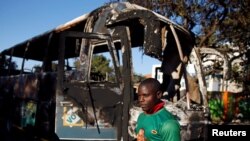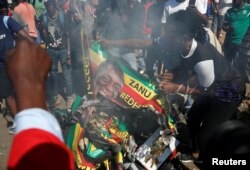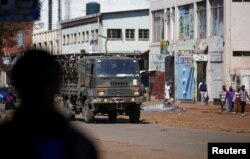Zimbabwean human rights activists on Thursday condemned soldiers’ actions in post-election violence that killed at least three people in the capital, as the nation’s electoral commission promised delayed presidential poll results would be issued soon.
"There's absolutely no skullduggery or anything untoward happening,” said Zimbabwe Electoral Commission chairman Emmanuel Magade, when asked why the presidential results had yet to be announced.
Legally, officials said, they have until August 4 to release results, and promised they would release them “very soon.”
Opposition challenger Nelson Chamisa has claimed victory in Monday’s election, and on Wednesday, hundreds of angry opposition supporters protested outside the election commission. Demonstrators threw rocks as police fired back with tear gas and water cannon. Later, army vehicles rolled through the streets, and soldiers were seen beating and shooting at pedestrians.
The streets of central Harare, usually a hive of activity and a snarl of traffic, were eerily quiet Thursday morning as soldiers and police manned the streets and told shopkeepers to close early and go home.
On Wednesday, the police announced that they had called in the army to assist in keeping order, invoking the controversial Public Order and Security Act. That act has been used during previous elections under the iron-fisted rule of longtime leader Robert Mugabe.
Activist Jestina Mukoko, director of the Zimbabwe Peace Project, described the soldiers’ response to protests as “outrageous.”
“Reports indicated that the [police] were in control of the situation when military vehicles were observed driving into the central business district,” she said. “Gunshots were fired randomly throughout the central business district, and forum observers witnessed soldiers randomly firing live bullets and beating up bystanders who were not involved in the protest. The military’s conduct fell short of internationally accepted standards in controlling protesting crowds.”
WATCH: Anita Powell's video report
On Monday morning, President Emmerson Mnangagwa appeared to strike a conciliatory tone on Twitter, saying he would call for an investigation into the violence. He also said, “We have been in communication with Nelson Chamisa to discuss how to immediately defuse the situation, and we must maintain this dialogue in order to protect the peace we hold dear.”
But Lizwe Jamela of Zimbabwe Lawyers for Human Rights said Zimbabwe’s leadership needs to do more than make statements.
“What is needed is a commitment that what happened yesterday will never happen again,” he said. “The statements may just be words loaded with promises, but the real issue is: what are they telling the soldiers that are on the street, what are they telling the police that are on the street in response to what is going to happen if citizens protest? What [are] the orders that are being given? Because responsibility lies entirely on the government of Zimbabwe to ensure that all Zimbabweans are being protected and that the sanctity of life is respected.”








